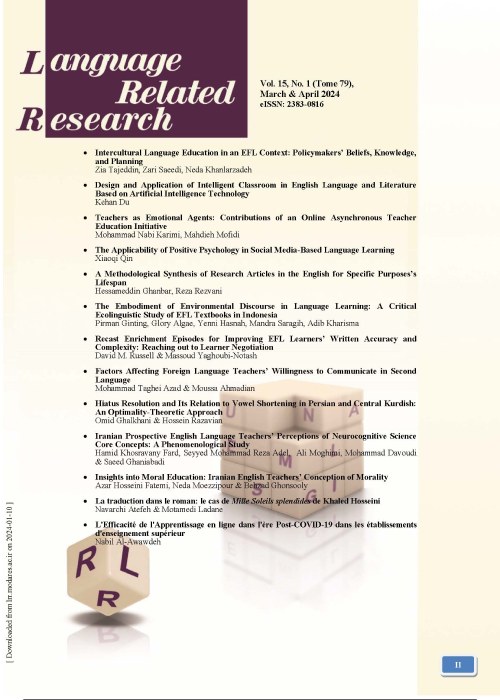Teaching French Translation at Universities in Iran: Study of the translationof polysemic words
Teaching French translation in Iran has been studied from different angles so far and its flaws and the problems encountered by students in this field have been repeatedly evaluated. However, it seems that researchers in Iran have not taken into account the problem of polysemic words and the translation of this ambiguous phenomenon. Hence, we have decided to study this phenomenon in university classes where students are trained to translate texts from French language to Persian.In this regard, considering the characteristics of the polysemic words and the ability of French translation students to recognize and then translate them properly in Persian, with a glance to Holmes/Toury map of translation studies and especially its functional branch, which includes teaching/learning translation and related methodologies and dictionaries as tools in this field among others. Therefore, we emphasize on the importance of training French translation students and the correct use of dictionaries according to Holmes/Toury theory.On the other hand, Katharina Reiss’ (German linguist and translator scholar) theory of translation and text typology (informative, expressive and operative) and their application have been used in this research. Usually, in translation classes at Iranian universities, informative and expressive texts are present and we used these two types of texts in our corpus as well.Also, we have utilized the theory of PACTE group from its translation competence in educational environments, through two tests among 32 undergraduate French translation students divided in two groups, as well as a review of the translation of the book written by French philosopher and writer of eighteenth century, Jean-Jacques Rousseau, Le Choix de lettres de Jean-Jacques Rousseau, translated by eight master and Ph.D. students in the field of French translation and French literature to scrutinize this particular problem.In the first case, we had advised to the first group to use only French-Persian dictionaires and to the second group to use not only the latter but also to consult inevitably French-French dictionaires in order to translate correctly the texts. More than two-thirds of the first group of students who used only French-Persian dictionaries failed to properly translate sentences containing this type of vocabulary, while in the second group the results were considerably satisfying. Among the graduate students, this problem still persists. It seems that finding the right equivalent for this kind of vocabulary, especially for French translation students who do not have sufficient knowledge of the language, seems complicated. This is because polysemic words can usually have different meanings in different contexts. French-Persian dictionaires on the market do not always contain all the meanings associated with polysemic words, which will make it even harder for the students to deal with the translation. Also, it seems from the sample translations of undergraduate and graduate students, this problem requires a fundamental solution from the very beginning of their studies. Explaining this problem to the students and informing them about this phenomenon and the gaps in French-Persian dictionaries is one of the first things that should be presented in translation classes. On the other hand, editing these dictionaries by their publishers or publishing new ones with regard to semantic ambiguities in French seems important. It also seems necessary to use monolingual dictionaries to find the appropriate equivalent of a word in the text.
- حق عضویت دریافتی صرف حمایت از نشریات عضو و نگهداری، تکمیل و توسعه مگیران میشود.
- پرداخت حق اشتراک و دانلود مقالات اجازه بازنشر آن در سایر رسانههای چاپی و دیجیتال را به کاربر نمیدهد.


